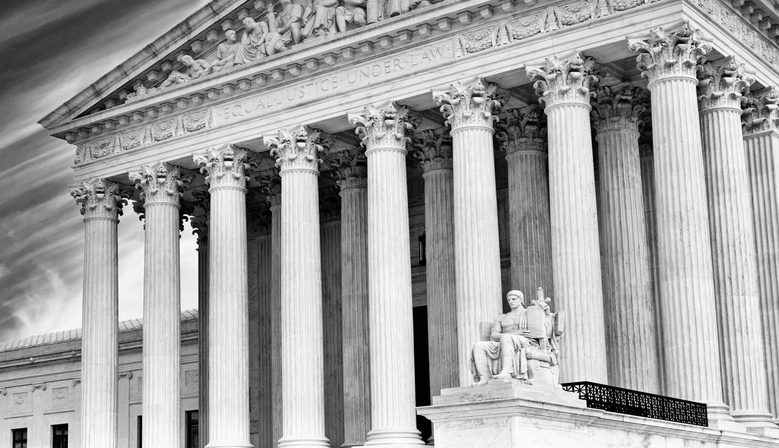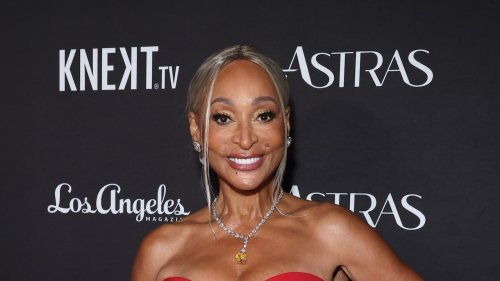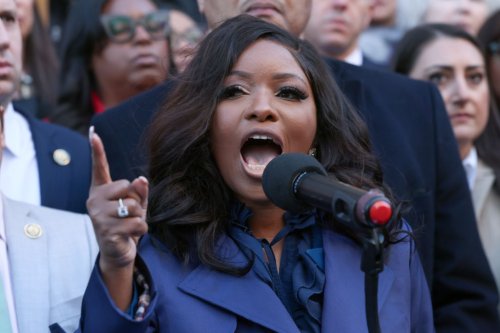Supreme Court Poised To Roll Back Black Voting Rights, Again
Source: Douglas Rissing / Getty The Confederacy and its disdain for Black and multiracial political power were on full display during the Supreme Court’s rehearing of Louisiana v. Callais earlier this week. Denying and eradicating Black voting rights and political power is a generational project not only in the South, but heavily grounded in the [...]


The Confederacy and its disdain for Black and multiracial political power were on full display during the Supreme Court’s rehearing of Louisiana v. Callais earlier this week. Denying and eradicating Black voting rights and political power is a generational project not only in the South, but heavily grounded in the land of Black Codes, Jim Crow, and rebellion.
Despite the clear mandate laid out in the Voting Rights Act of 1965, the Supreme Court seems poised to weaken the already diminished landmark law. Reporting from the Guardian highlighted conservative justices drilling Janai Nelson, president and director-counsel at the Legal Defense Fund, on the limits of race-based measures.
“The Supreme Court has an opportunity to reaffirm this nation’s commitment to a multiracial, multiethnic democracy by standing firm on its recent decision in Allen v. Milligan just two years ago, enforcing the Voting Rights Act to ensure fair districting free from racial discrimination,” Nelson said in a statement. “For the fourth term in a row, LDF proudly returns to the Court to ensure Black communities can participate in the electoral process on an equal basis and have an equal say in how they are represented.”
By some estimates, allowing the restriction or even striking Section 2 would leave Black and other voters of color without the ability to choose our representatives, particularly in deeply entrenched extremist states. The decision hangs in the balance as Black and Latino voters are fighting against extremist state legislatures trying to stack the deck for 2026 and beyond.
As NewsOne previously explained, Callais was brought by “non-Black” voters obsessed with denying Black voters an equal right to fair representation in Congress. The objection to Black voters having a fair choice in who represents them follows their successful litigation in Robinson v. Ardoin, which led to the creation of the second district.
Dr. Press Robinson, a lead plaintiff in Robinson v. Ardoin, expressed hope that the Court would “recognize and cement” Black voters’ right to a “fair” electoral map.
“Our fight for fair maps has taken years and builds on the legacy of generations of Black voters who have demanded an equal voice in our democracy,” Robinson said. “And we are proud to be before the court yet again, fighting for our communities, our state, and our democracy.”
Edgar Cage, another Black voter involved in Robinson v. Ardoin, called on the Supreme Court to reaffirm the right to a fair congressional map.
“In order for our democracy to work, it is critical that the Supreme Court reaffirms Louisiana’s right to a fair congressional map,” Cage said. “Today, we stand on the shoulders of so many champions of civil rights who fought for the protections of the Voting Rights Act and the promise of a representative democracy. It is in that legacy that we continue to fight for our foundational rights.”
Callais follows a multi-year effort by Black Louisiana voters to have fair representation after the 2020 Census showed an increase in the state’s Black population. Black voters and organizations like the Power Coalition for Equity and Justice spent years organizing communities to engage in the Census and redistricting process in preparation for new maps.
“Yet again, we arrived at the Supreme Court today ready to continue our fight to secure fair opportunities for Black voters in Louisiana,” Ashley Shelton, president and CEO of Power Coalition for Equity and Justice, said in a statement. “Fair maps don’t just mean better representation — they can mean safer streets, lower prices, and better schools for our communities. We will be relentless in our pursuit of real justice and meaningful representation. Our democracy cannot function unless all voters has fair opportunities to elect candidates of choice.”
According to the Legal Defense Fund, the maps complied with Section 2 of the Voting Rights Act. The Court affirmed Section 2 in the 2023 decision Allen v. Milligan, which involved a similar decision in Alabama to create a second majority Black congressional district. The organization also emphasized that prior testimony demonstrated that the maps served a dual political purpose regarding incumbent protection.
Similar to the bad takes that led to the disastrous decision Shelby County v. Holder, conservative justices were not operating in good faith in questions about whether race-based remedies should have an endpoint. The entire rehearing process gave opponents to Black political power and voting rights a second bite of the apple, not just in Callais, but finishing what Shelby County started. The same kind of opponents notably led the Court down this path in the 2013 case Shelby County v. Holder, which stripped away vital protections from the act. Efforts to undermine Black political power ramped up in the case’s immediate aftermath.
Passed 60 years ago, the Voting Rights Act offered an opportunity to fulfill the promise of the 15th and 19th amendments and provide Black voters with full citizenship. Now, over 160 years after emancipation, Black voters continue to fight for voting rights, fair representation, and other constitutionally guaranteed rights and freedoms.
Kimberle Crenshaw, co-founder and Executive Director of the African American Policy Forum, connected the current incursion against the Voting Rights Act in Callais with the broader “anti-woke” effort.
“If the Court approves this reverse logic, it’s not just a blow to civil rights; it’s a threat to democracy itself, allowing state legislators to dilute the power of voters of color and permanently rig our systems against free and fair representation,” she said in a statement. This assault on the VRA reveals that the stubborn refusal to extend basic equal protections to Black people doesn’t just harm Black communities; it threatens the possibility of democracy for everyone.”
SEE ALSO:
New Supreme Court Term Considers Limits on American Fascism
Republican Jim Crow Reboot Requires A New Approach To Politics
Share
What's Your Reaction?
 Like
0
Like
0
 Dislike
0
Dislike
0
 Love
0
Love
0
 Funny
0
Funny
0
 Angry
0
Angry
0
 Sad
0
Sad
0
 Wow
0
Wow
0
















